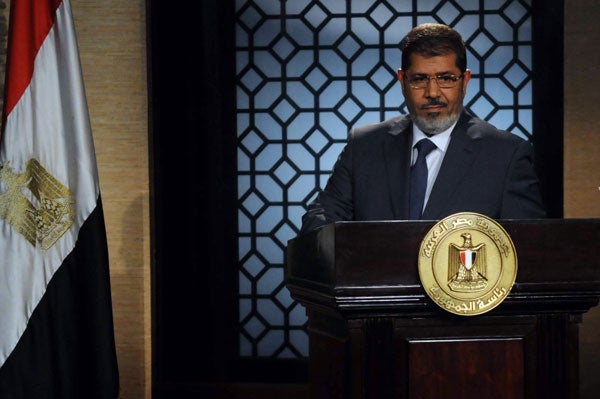Egypt was wracked by protests today, the day after President Mohamed Morsi purged key judicial officials and issued a decree that granted himself sweeping new powers. In Cairo, protesters gathered in Tahrir Square, the epicenter of Egypt’s stalled revolution, to denounce Morsi’s power grab and chant: “Morsi is Mubarak.” There were reports of heavy rioting in three Suez Canal cities, Suez, Port Said, and Ismaila, with angry crowds burning the offices of Morsi’s political party, the Freedom and Justice Party.
Opposition political leaders accused Morsi of “monopolizing all three branches of government.” Mohamed El Baradei tweeted that Morsi had “appointed himself Egypt’s new pharaoh.”
Morsi made his lunge for power shortly after helping to broker a fragile ceasefire in Gaza between Israel and Hamas, the extremist offshoot of his own Muslim Brotherhood. Morsi may calculate that his help in administering Band-Aids to the festering Israeli-Palestinian conflict will make the United States and others who give aid to Egypt think twice before trying to reverse his power grab.
If so, the Obama Administration should quickly set him straight. It should leverage U.S. aid to pressure the Egyptian leader to respect the rule of law, abide by the decisions of Egypt’s courts, and abandon his drive for absolute power. Morsi has exploited external crises in the past to advance his own ambitions. In August, he used a Sinai terrorist attack that killed Egyptian soldiers as a pretext to purge the Egyptian army of its top Mubarak-era holdovers. Now he has done the same with the judiciary.
Morsi appears to be acting in accord with George Orwell’s dictum: “One does not establish a dictatorship in order to safeguard a revolution; one makes a revolution in order to establish a dictatorship.”
See also: Greater U.S. Pressure Needed to Ensure Successful Egyptian Transition



























